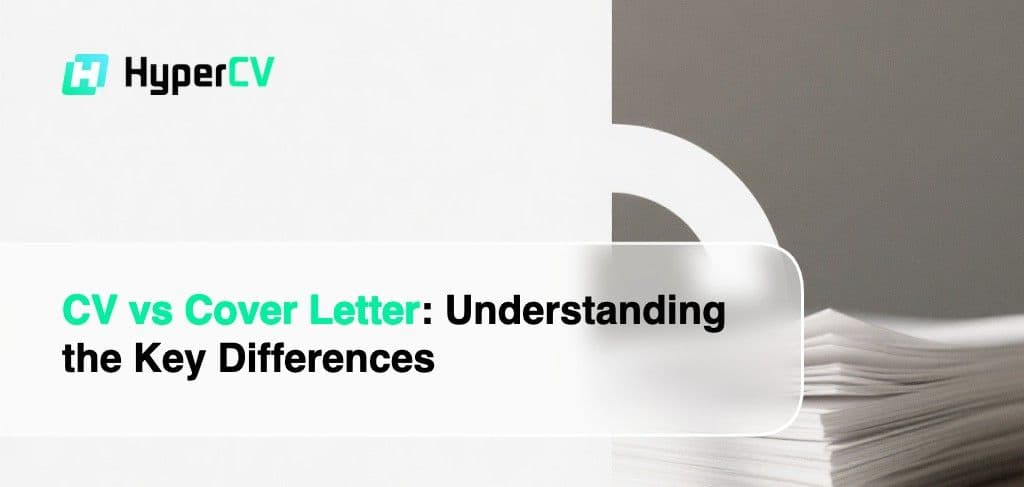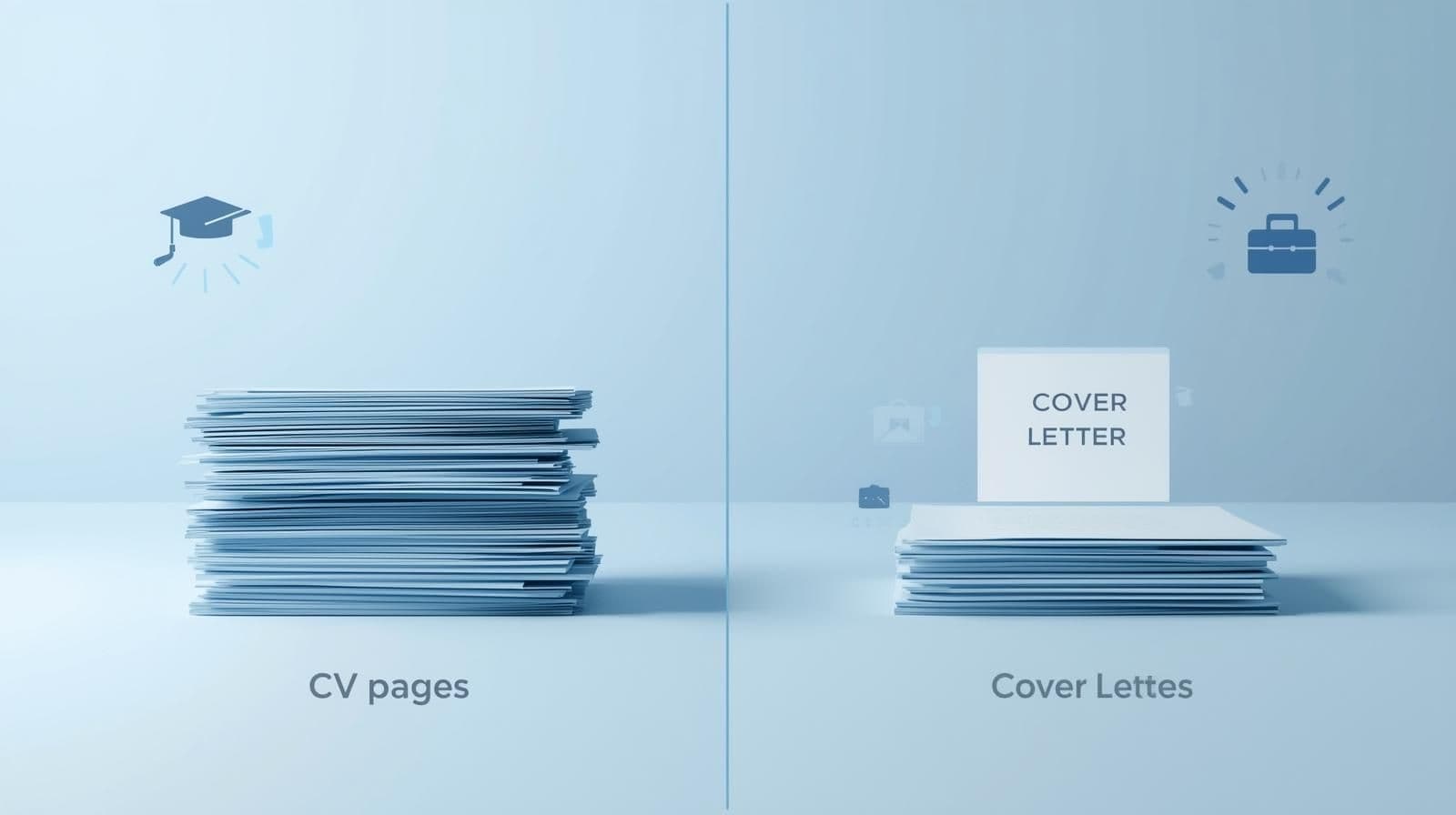CV vs Cover Letter: Understanding the Key Differences

You've found the perfect job posting and you're ready to apply. But wait - should you send a CV or a cover letter? Maybe both? If you're confused about the cv vs cover letter difference, you're not alone.
Many job seekers struggle with knowing when to use a CV versus a cover letter. Getting this wrong could hurt your chances of landing that dream job. The good news is that once you understand the key differences, you'll know exactly which document to use and when.
Let's break down everything you need to know about these job application documents so you can submit winning applications every time.
What is a CV?
A Curriculum Vitae (CV) is a detailed document that shows your entire work and school history. Think of it as your complete career story on paper.
Unlike a resume, which is usually 1-2 pages, a CV can be much longer - sometimes 3-5 pages or more. According to career experts at Resume Genius, a CV provides "a full snapshot of your professional background" and includes:
- Your complete education history
- All work experience
- Research projects
- Publications
- Awards and honors
- Professional certifications
- Conference presentations
- Volunteer work
CVs are most often used in academic fields, research jobs, and medical careers. They're also the standard in many countries outside the United States.
What is a Cover Letter?
A cover letter is a one-page document that introduces you to potential employers. It's your chance to make a personal connection and explain why you're perfect for the specific job.
As noted by experts at Indeed, a good cover letter is "a three- to four-paragraph document submitted alongside a resume" and should be around 250-400 words. It includes:
- A professional greeting
- An engaging introduction
- Why you're interested in the role
- Your relevant skills and achievements
- Why you want to work for that company
- A strong closing with a call to action
The cover letter works alongside your resume or CV to tell your story in a more personal way.
CV vs Cover Letter: The Main Differences
Here's a clear comparison of the key differences between CVs and cover letters:
| Aspect | CV | Cover Letter |
|---|---|---|
| Length | 3-5+ pages | 1 page (250-400 words) |
| Purpose | Complete career overview | Job-specific introduction |
| Content | Comprehensive history | Targeted achievements |
| Format | Detailed lists and sections | Narrative paragraphs |
| Customization | Minimal changes needed | Highly customized per job |
| Usage | Academic/research roles | Most job applications |
Length and Detail
The most obvious difference is length. A CV gives complete details about your entire career, while a cover letter gives a brief, targeted overview of why you're right for one specific job.
Your CV should include everything relevant to your field - every job, degree, certification, and achievement. Your cover letter should focus only on the most relevant points that match the job requirements.
Purpose and Focus
A CV serves as a complete record of your professional life. It's like a detailed reference book that employers can review to understand your full background.
A cover letter has a different goal - it's your sales pitch. You're trying to convince the hiring manager that you deserve an interview. As Career.io explains, it should "highlight your suitability for a specific job" and complement your resume or CV, not repeat it.
Customization Requirements
You can use the same CV for multiple applications with only minor updates. The comprehensive nature means it already covers most of what employers need to know.
Cover letters require much more customization. Each one should be tailored to the specific job and company. This means researching the company, understanding the role, and highlighting different achievements for each application.

When to Use a CV vs Cover Letter
Use a CV When:
- Applying for academic positions (professor, researcher)
- Seeking medical or scientific roles
- Applying for fellowships or grants
- Job hunting in Europe, Asia, or other regions where CVs are standard
- The job posting specifically requests a CV
Use a Cover Letter When:
- Applying for most business and corporate jobs
- The job posting asks for a cover letter
- You want to explain gaps in employment
- You're changing careers and need to connect your experience to the new field
- You have specific achievements that directly relate to the job
Using Both Documents
Sometimes you'll need both a CV and a cover letter. This often happens in academic settings where the CV provides the detailed background and the cover letter explains your interest in the specific position.
In business settings, you might submit a resume (rather than a CV) along with a cover letter. According to My Perfect Resume, "cover letters provide additional context to your CV or resume" and help showcase your motivation.
Common Mistakes to Avoid
CV Mistakes:
- Making it too short and leaving out important details
- Using the wrong format for your field
- Including irrelevant personal information
- Forgetting to update it regularly
Cover Letter Mistakes:
- Writing the same generic letter for every job
- Simply repeating what's in your resume
- Making it too long or too short
- Forgetting to research the company
- Not including a clear call to action
Tips for Success
For Your CV:
- Keep it organized - Use clear headings and consistent formatting
- Update regularly - Add new achievements, certifications, and experiences
- Focus on relevance - While comprehensive, emphasize items most relevant to your field
- Use action words - Start bullet points with strong verbs
For Your Cover Letter:
- Research first - Learn about the company and role before writing
- Show enthusiasm - Express genuine interest in the position
- Use specific examples - Include numbers and concrete achievements
- Keep it professional - Maintain a formal but engaging tone
- Proofread carefully - Typos can eliminate you from consideration
The Bottom Line
Understanding the cv vs cover letter difference is crucial for job search success. A CV provides a comprehensive overview of your entire career, while a cover letter offers a targeted introduction for a specific role.
Most job seekers will use cover letters more frequently, as they're standard for business and corporate positions. CVs are essential for academic, medical, and research careers.
The key is knowing what each document does and when to use it. Both should be well-written, error-free, and professionally formatted. Whether you're submitting a CV, cover letter, or both, make sure each document serves its purpose in telling your professional story.
Remember - your application documents are often the first impression you make on potential employers. Taking time to understand and perfect both your CV and cover letter skills will pay off throughout your career.
With this knowledge, you're ready to create compelling application materials that showcase your qualifications and help you land the job you want.